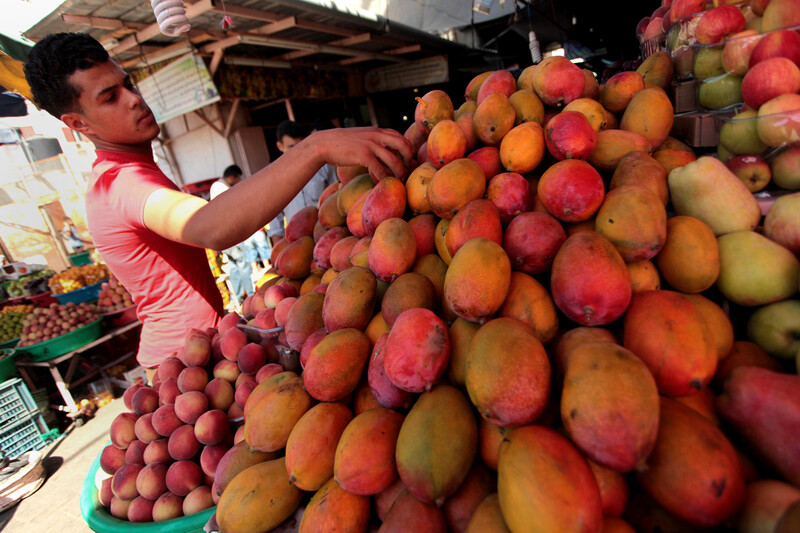The Electronic Intifada Gaza Strip 30 May 2015

A new “solidarity tax” imposed by Hamas to help fill a government deficit is making it even harder for many Palestinians in Gaza to make ends meet.
APA imagesAlready suffering from high levels of poverty, unemployment and a suffocating siege, the Palestinian people of Gaza are now facing higher grocery bills.
Hamas, the party in charge of Gaza’s administration, has pushed up prices by imposing a so-called solidarity tax on imported goods. The move — which went into effect in April — has been presented as necessary to cover public sector wages.
But it has drawn severe criticism from both traders and their customers.
Um Muhammad, a woman in her sixties, expressed the frustration of many Gaza residents while out shopping in the markets of Beach refugee camp. The new prices, she said, have meant she has to sell powdered milk provided by UNRWA, the UN agency for Palestine refugees, in order to buy groceries.
“I can barely afford to buy vegetables,” she said. Um Muhammad was seeking food for her son Muhammad and his family. Muhammad is a fisherman, who often only has one day’s work per week.
The tax has resulted in the prices of some goods jumping 10 percent.
“Unjustified”
Abu Hussein sells kitchen equipment in Beach camp. He pointed to Egyptian trays that were previously on sale for $20. Now he has to charge $22. Abu Hussein said that asking customers for more money causes “embarrassment” for him. But he does not have any other choice.
Nasser al-Hilou, vice-chair of the Gaza Chamber of Commerce, described the tax as “totally unjustified.” He argued that it was a burden on traders because it was additional to the customs duties levied on imports.
Such customs duties are collected by Israel, which, under the terms of the Oslo accords, is obliged to transfer them to the Palestinian Authority.
On many occasions, however, Israel has withheld the revenue to punish the Palestinian Authority for political stances or actions it opposes, deepening the chronic governmental financial crises in both the West Bank and Gaza.
Mohsen Abu Ramadan, an economic analyst in Gaza, cited data indicating that 70 percent of Gaza’s 1.8 million people live in poverty, with unemployment at 42 percent. Some estimates put the number even higher.
While acknowledging that Hamas is struggling to pay salaries owed to 42,000 public sector workers, he criticized it for introducing the tax. “Hamas should have acted in coordination with other political parties in the Gaza Strip,” he said.
In April 2014, a “national unity” accord was signed between Hamas and Fatah. It led to the formation of a “consensus” government comprised of technocrats and based in Ramallah. Yet rivalries between the two parties persist and the consensus government has little sway on the ground.
Farraj al-Ghoul, a Hamas-affiliated member in the Palestinian Legislative Council, defended the tax. He said that it applies to firms with an annual profit of more than $1 million.
The aim of the tax, he said, is to assist “tens of thousands of households deprived of financial assistance by the consensus government.”
The Ramallah-based government has refused to recognize and pay the public sector employees hired in Gaza under Hamas’ administration.
The legislature’s term expired in 2010 — four years after Hamas won a majority of seats in it. Yet al-Ghoul claimed that it was still legal for it to introduce new taxes as no fresh elections have been called.
The presidential term of Ramallah-based Palestinian Authority leader Mahmoud Abbas, who heads Fatah, also expired five years ago.
Jamil al-Majdalawi, a Gaza-based representative of the Popular Front for the Liberation of Palestine, argued that the tax would “further complicate” efforts to achieve reconciliation between Hamas and Fatah.
Even if the tax is only being levied on large firms, its effects can be felt at street level because the increased costs are being passed on to the ordinary consumer.
Nabhan, a father of seven children, said he can only buy fruit once a week. The rest of the time “I can only smell them in the market,” he added.
“A kilo of bananas now costs $2,” he said. “Is this fair for someone with a terrible standard of living?”
Rami Almeghari is a journalist and university lecturer based in the Gaza Strip.





